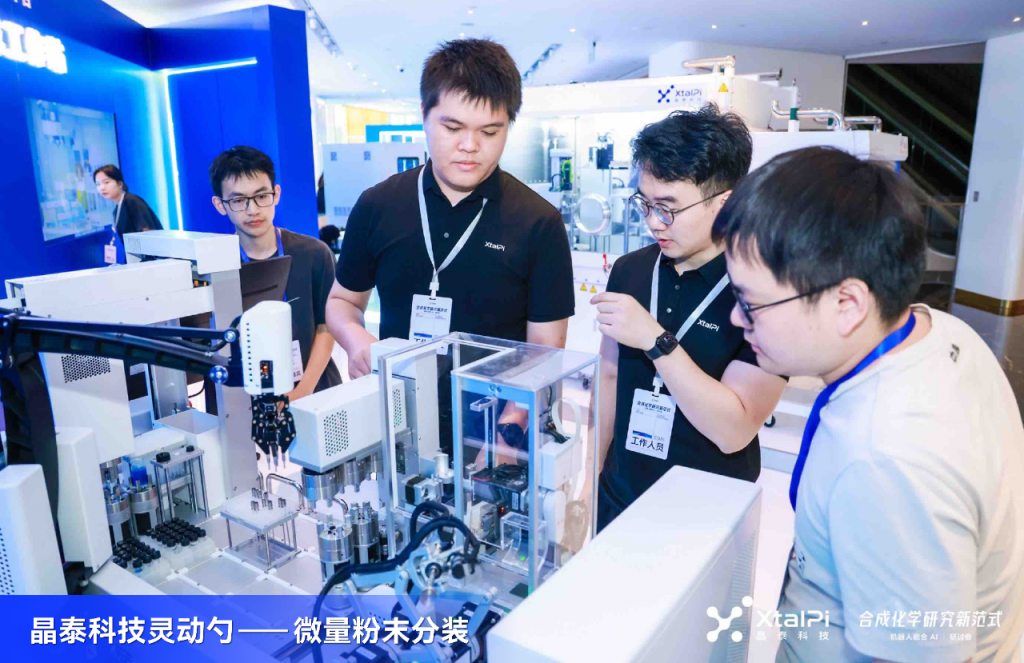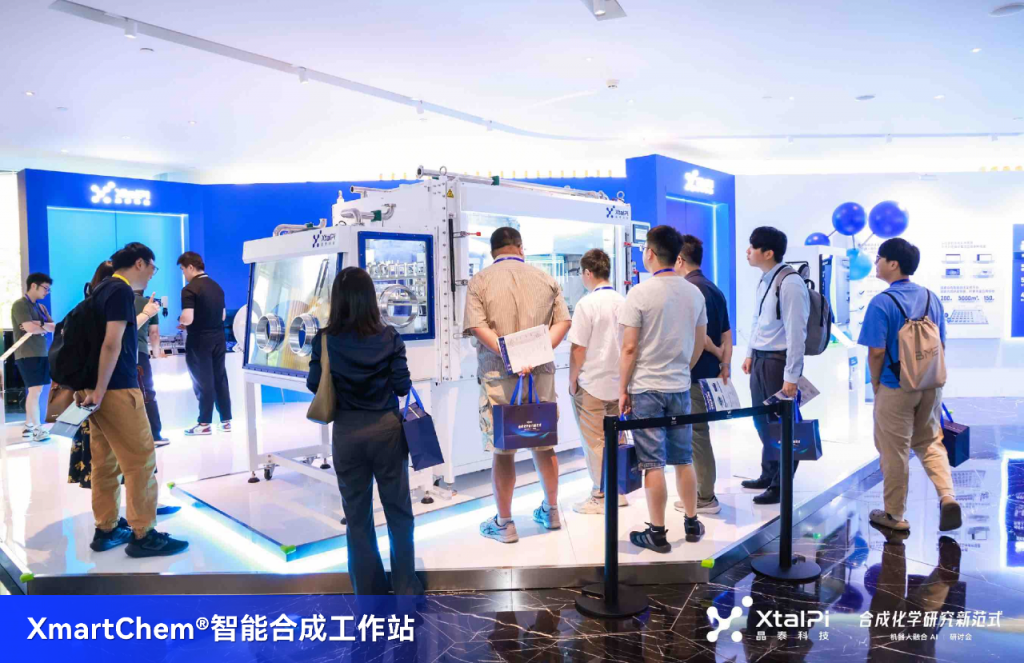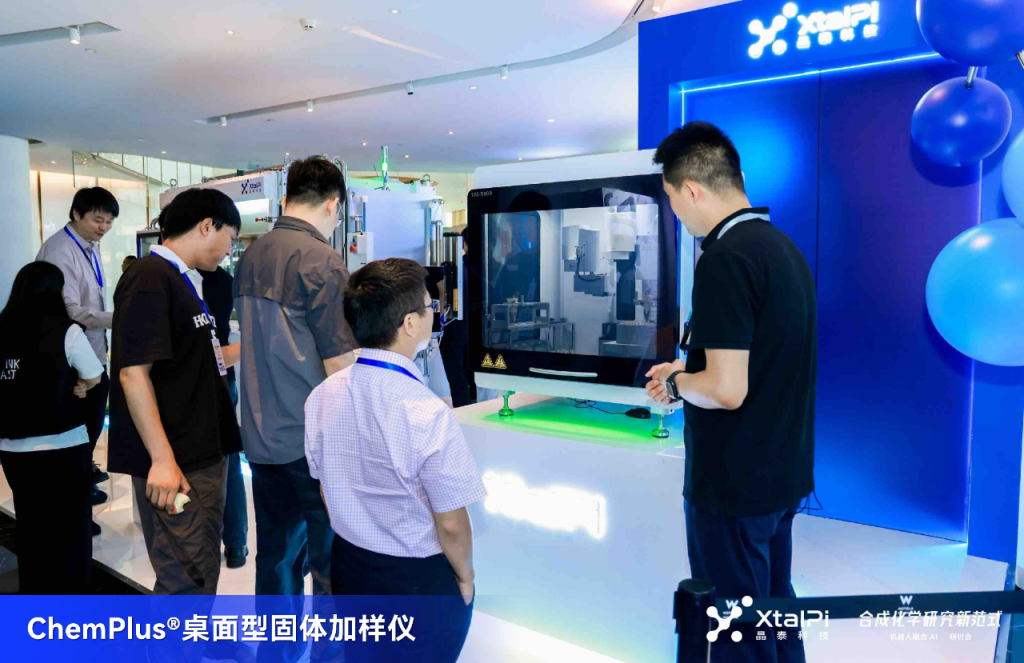he “New Paradigm in Synthetic Chemistry: AI and Robotics Symposium,” hosted by XtalPi Inc. with academic support from the Hefei Pilot Functional Molecule Research Institute, successfully concluded on June 28-29, 2025, in Shanghai. Chaired by Academician Ma Shengming of the Chinese Academy of Sciences and The World Academy of Sciences, and Professor at Fudan University, the event featured distinguished speakers, including Academician Yang Weimin of the Chinese Academy of Engineering and Director of the National Key Laboratory of Green Chemical Engineering and Industrial Catalysis at Sinopec Shanghai Research Institute, Professor Zhu Shoufei, Vice President of Nankai University, Professor Fang Qun, Distinguished Professor at Zhejiang University’s Department of Chemistry, Dr. Ma Jian, Co-Founder and CEO of XtalPi, and experts from Tsinghua University, Peking University, Zhejiang University, Guangzhou National Laboratory, and Roche China. The two-day symposium attracted over 300 researchers, academics, and industry professionals in person to explore how AI and robotics are transforming fundamental scientific research, with more than 10,000 online participants joining the discussions.
Centered on the theme “Integration of Robotics and Artificial Intelligence,” the symposium brought together hundreds of experts from academia and industry in synthetic chemistry to discuss cutting-edge applications of robotics, AI, and their convergence in chemical synthesis. The event explored innovative pathways and future visions for synthetic chemistry under the wave of automation, data-driven approaches, and intelligent technologies.
As AI continues to deepen its impact across industries and research, and laboratory robotics advance in chemical automation, synthetic chemistry is moving toward comprehensive automation, digitization, and intelligence. Key challenges include accelerating material discovery through AI and robotics integration to explore vast chemical spaces, achieving efficiency revolutions through academic-industry collaborations, and enabling China to leapfrog in AI-driven synthetic chemistry research. These issues are increasingly critical to the field’s progress.
Synthetic chemistry, the cornerstone of creating and transforming matter, has shaped human life through breakthroughs like ammonia synthesis (the foundation of fertilizers and explosives), nylon (the pioneer of synthetic materials), and penicillin (the first antibiotic). Each milestone has redefined industries and driven human progress. However, as society demands molecules with enhanced performance and scientists explore increasingly complex chemical spaces, traditional research paradigms reliant on empirical knowledge and manual experimentation struggle to meet modern needs.
Since the 1970s, advancements in computing, AI, automation, and cloud technology have shifted synthetic chemistry from experience-driven to data- and intelligence-driven approaches. AI models for predictive experimental design and robotic automation for enhanced efficiency have become key trends. The Lawrence Berkeley National Laboratory’s A-Lab, operating 24/7, has synthesized novel materials, accelerating discoveries in material science. The University of Liverpool’s robotic chemist, featured on the cover of Nature, discovered a new catalyst through autonomous experiment planning and execution, earning a second Nature feature. The fusion of robotics and AI is reshaping research paradigms, speeding up material discovery and industrialization, and driving profound changes in chemical science.
The symposium opened on June 28 with welcome addresses by Academician Ma Shengming and Dr. Ma Jian, Co-Founder and CEO of XtalPi. Academician Ma’s keynote, “ATA, Automation, and Machine Learning,” traced the development of the ATA reaction (Allenation of Terminal Alkynes), its challenges, and progress in a collaborative automated synthesis platform developed with XtalPi. This platform generates high-quality data to advance machine learning applications, expand ATA reactions, and overcome bottlenecks under mild conditions.

Academician Ma Shengming
Academician of the Chinese Academy of Sciences and The World Academy of Sciences, Professor at Fudan University
Academician Yang Weimin’s keynote, “Creation and Application of Molecular Sieve Catalytic Materials: From Data-Driven to AI-Driven,” highlighted the critical role of catalytic materials in modern chemical industries. He discussed how material gene engineering and AI-driven paradigms can shorten development cycles and accelerate the creation of new catalytic materials.

Academician Yang Weimin
Academician of the Chinese Academy of Engineering, Director of the National Key Laboratory of Green Chemical Engineering and Industrial Catalysis, Dean of Sinopec Shanghai Research Institute
Dr. Ma Jian, in his keynote “AI in Chemistry: From the Micro to the Macro,” described chemistry as a discipline bridging the microscopic and macroscopic, impacting society across time and space. From extending lifespans through new drugs to advancing materials and energy for faster, farther travel, he reviewed XtalPi’s decade-long journey in crystal structure prediction, drug discovery, and robotic automation. He introduced XtalPi’s intelligent autonomous experimentation platform, which integrates automated execution with AI-driven prediction and design to conduct experiments with greater precision, safety, and efficiency, significantly accelerating material discovery.

Dr. Ma Jian
Co-Founder and CEO of XtalPi
Over the two days, experts including Researcher Hong Xin from Zhejiang University’s Department of Chemistry, Professor Zhu Shoufei of Nankai University, Professor Luo Sanzhong of Tsinghua University’s Department of Chemistry, Professor Chen Huajun of Zhejiang University’s College of Computer Science and Technology, Dr. Duan Chenru, Co-Founder and CTO of Hangzhou Deep Principle Technology, Dr. Zhu Wei, Head of Medicinal Chemistry at Roche China Innovation Center, Professor Fang Qun of Zhejiang University, Dr. Zhang Peiyu, Chief Scientific Officer of XtalPi, Professor Mo Fanyang of Peking University’s School of Materials Science and Engineering, Professor Lan Yu, Vice Dean of Zhengzhou University’s College of Chemistry, and Researcher Liao Kuangbiao of Guangzhou National Laboratory delivered insightful presentations. They explored the latest advancements in robotics and AI in chemical research and discussed how the “AI + robotics” paradigm empowers synthetic chemistry across various subfields.
At the symposium, XtalPi’s self-developed intelligent autonomous experimentation platform drew significant attention. Multiple robotic synthesis workstations showcased real-world applications of “AI + robotics” across diverse R&D scenarios. Powered by domain-specific AI models as the “brain,” the platform handles experiment design and reaction prediction, while automated robotic workstations serve as the “hands,” executing high-precision, high-throughput, and safer chemical operations. Data collected by the robots feeds back into the AI models, creating a virtuous cycle of improved predictions and optimized designs. This paradigm enhances chemical space exploration efficiency through data-driven decisions and high-throughput automation, accelerating material discovery.
The platform has amassed extensive success cases in biomedicine, chemical engineering, renewable energy, and new materials. Since 2024, XtalPi has delivered customized intelligent autonomous experimentation platforms to leading institutions, including Academician Ma Shengming’s team at Fudan University, Sinopec Shanghai Research Institute, and the Guangdong Laboratory of Chinese Medicine (Hengqin Laboratory). These platforms support diverse applications, including organic synthesis, formulation optimization, catalyst engineering, and electrolyte engineering.





